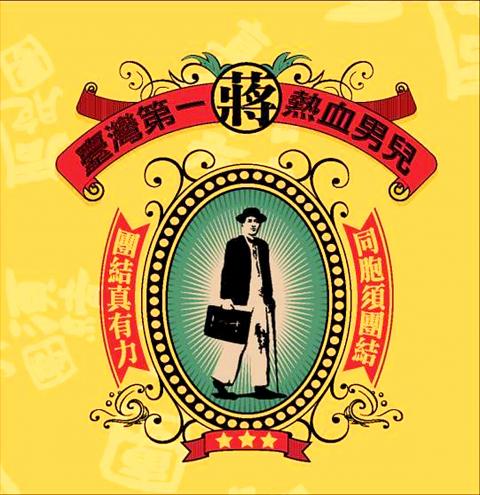Taiwanese democracy pioneer Chiang Wei-shui’s (蔣渭水) ashes are to be reinterred in his native Yilan County on Oct. 17, with an exhibition and a two-day concert to honor his life, the Yilan County Government said.
Born in Yilan in 1891, Chiang was an anti-colonialist who fought Japanese rule and the founder of the Taiwanese Cultural Association, Taiwanese Workers’ League, Taiwanese People’s Party and the Taiwan Minpao newspaper. Chiang, who died in 1931 in Taipei, is considered the first significant leader to promote Taiwanese culture and autonomy.
A motorcade is to take Chiang’s ashes from Taipei’s Liuzhangli Public Cemetery to Yilan’s Cherry Blossom Cemetery, Yilan County Civil Affairs Department Director Shao Chih-chi (邵治綺) said.

Photo courtesy of Yilan County Government
Shao said the county government renamed a hill at Cherry Blossom Cemetery “Wei-shui Hill” (渭水之丘) to commemorate “a man of action who moved forward ceaselessly.”
This was also the inspiration for the design for the event’s logo: “Chiang Wei-shui, the Walker.”
Artist Wen Hsiao-mei (溫曉梅) was invited to create the Chiang Wei-shui Exhibition: Images and Installations, Shao said.
The exhibition’s visual motif of an “open window” signifies how Chiang opened vistas to the future for Taiwanese, she said, adding that the show is to open on Thursday in Yilan City’s Dioudioudang Forest Park Square (丟丟噹森林廣場). The funeral procession is to stop at seven Yilan City historic sites associated with Chiang, including his residence, Wenchang Temple (文昌廟), Chaoyin Temple (昭應宮) and the Temple of the City God (城隍廟), she said.
Concerts are to be held on Oct. 17 and Oct. 18, featuring musicians known for social activism, she said. Performers on the first day include Jacky Chen (陳建瑋), Chen Ming-chang (陳明章), Lin Sheng-xiang (林生祥), Ilid Kaolo and punk group Fire Ex (滅火器), while the Village Armed Youth (農村武裝青年), Hakka hip-hop artist Kou Chou Ching (拷秋勤) and the Taipei Chinese Orchestra perform on the second day, she said.

A preclearance service to facilitate entry for people traveling to select airports in Japan would be available from Thursday next week to Feb. 25 at Taiwan Taoyuan International Airport, Taoyuan International Airport Corp (TIAC) said on Tuesday. The service was first made available to Taiwanese travelers throughout the winter vacation of 2024 and during the Lunar New Year holiday. In addition to flights to the Japanese cities of Hakodate, Asahikawa, Akita, Sendai, Niigata, Okayama, Takamatsu, Kumamoto and Kagoshima, the service would be available to travelers to Kobe and Oita. The service can be accessed by passengers of 15 flight routes operated by

Alain Robert, known as the "French Spider-Man," praised Alex Honnold as exceptionally well-prepared after the US climber completed a free solo ascent of Taipei 101 yesterday. Robert said Honnold's ascent of the 508m-tall skyscraper in just more than one-and-a-half hours without using safety ropes or equipment was a remarkable achievement. "This is my life," he said in an interview conducted in French, adding that he liked the feeling of being "on the edge of danger." The 63-year-old Frenchman climbed Taipei 101 using ropes in December 2004, taking about four hours to reach the top. On a one-to-10 scale of difficulty, Robert said Taipei 101

Taiwanese and US defense groups are collaborating to introduce deployable, semi-autonomous manufacturing systems for drones and components in a boost to the nation’s supply chain resilience. Taiwan’s G-Tech Optroelectronics Corp subsidiary GTOC and the US’ Aerkomm Inc on Friday announced an agreement with fellow US-based Firestorm Lab to adopt the latter’s xCell, a technology featuring 3D printers fitted in 6.1m container units. The systems enable aerial platforms and parts to be produced in high volumes from dispersed nodes capable of rapid redeployment, to minimize the risk of enemy strikes and to meet field requirements, they said. Firestorm chief technology officer Ian Muceus said

MORE FALL: An investigation into one of Xi’s key cronies, part of a broader ‘anti-corruption’ drive, indicates that he might have a deep distrust in the military, an expert said China’s latest military purge underscores systemic risks in its shift from collective leadership to sole rule under Chinese President Xi Jinping (習近平), and could disrupt its chain of command and military capabilities, a national security official said yesterday. If decisionmaking within the Chinese Communist Party has become “irrational” under one-man rule, the Taiwan Strait and the regional situation must be approached with extreme caution, given unforeseen risks, they added. The anonymous official made the remarks as China’s Central Military Commission Vice Chairman Zhang Youxia (張又俠) and Joint Staff Department Chief of Staff Liu Zhenli (劉振立) were reportedly being investigated for suspected “serious